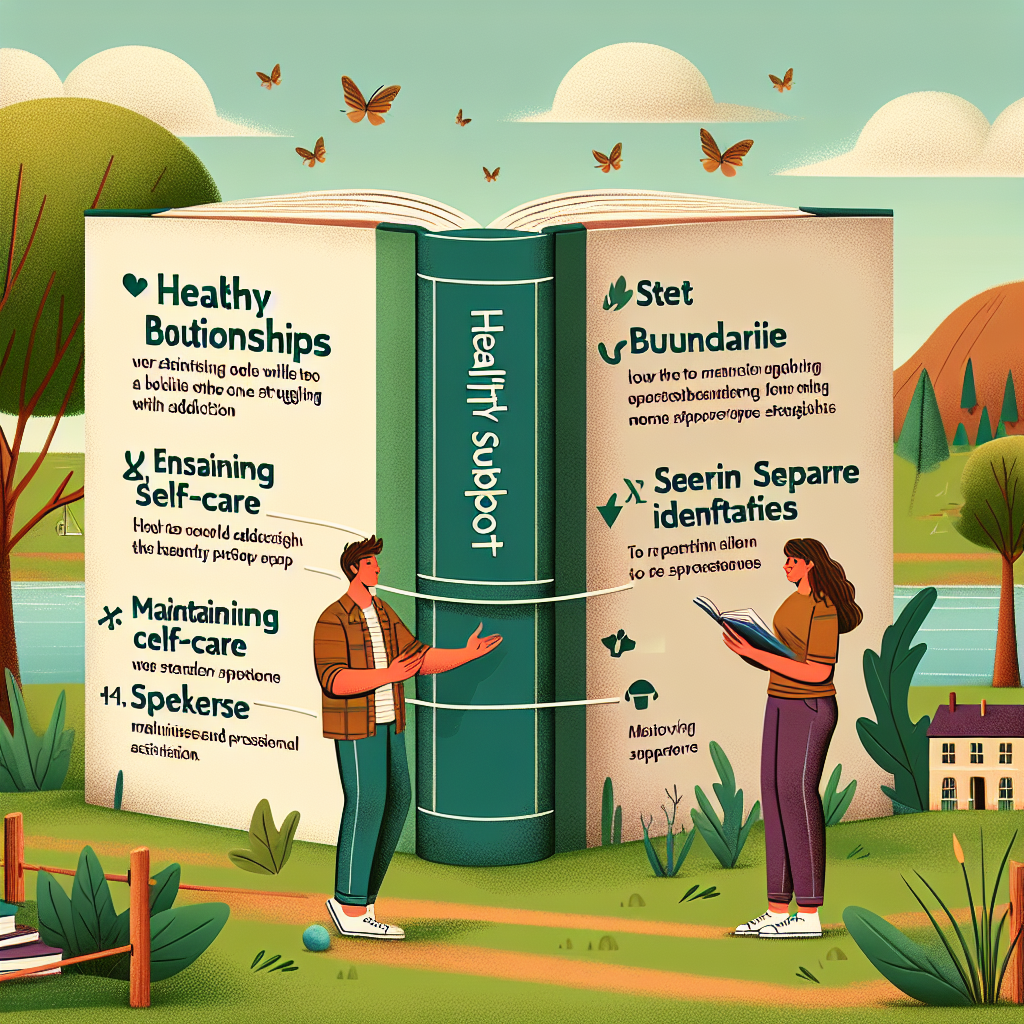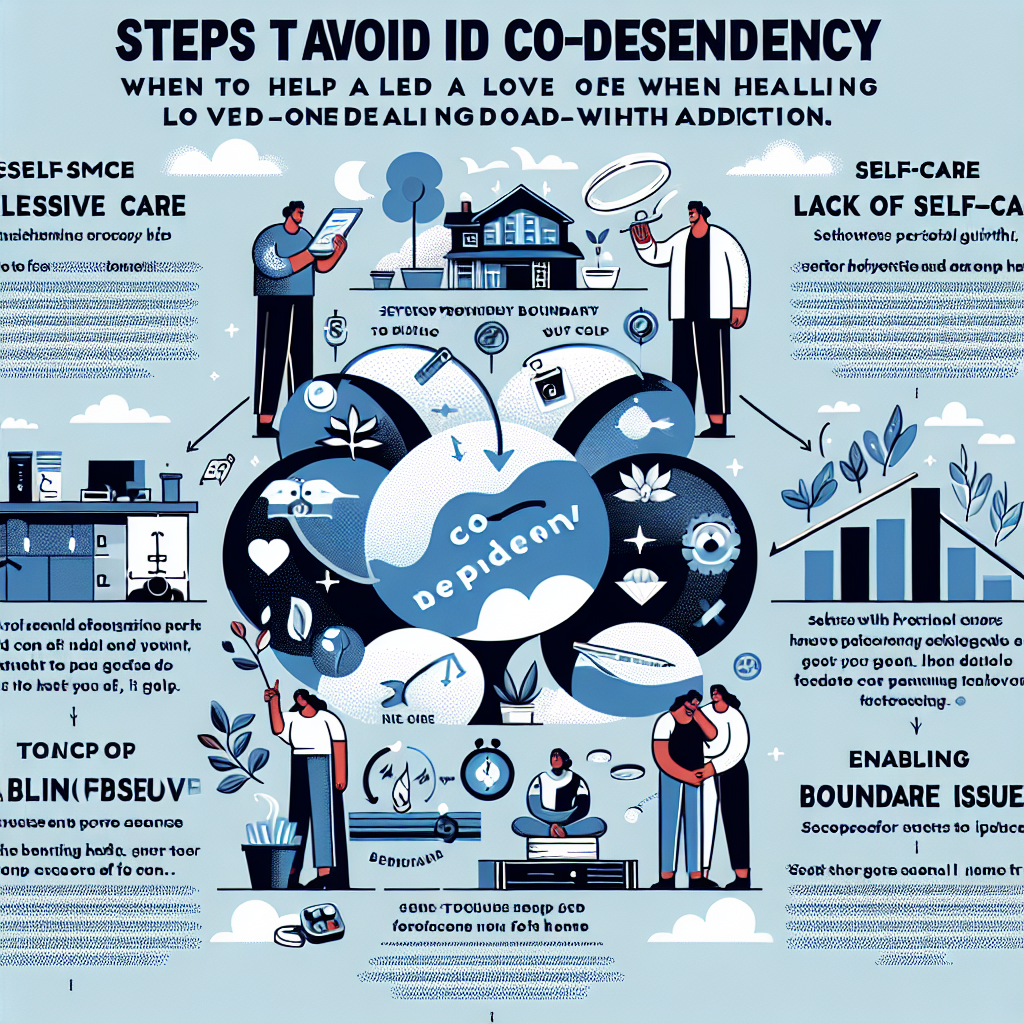-
Table of Contents

“Empower, Don’t Enable: Support Without Losing Yourself”
Introduction
Co-dependency is a complex and often misunderstood dynamic that can arise when helping a loved one with addiction. It involves an unhealthy reliance on another person for emotional or psychological support, often leading to enabling behaviors that can perpetuate the cycle of addiction. To effectively support a loved one without falling into the trap of co-dependency, it is crucial to establish healthy boundaries, practice self-care, and encourage personal responsibility. This introduction will explore strategies to maintain a balanced approach, ensuring that your support is both compassionate and constructive, ultimately fostering a healthier environment for both you and your loved one.
Setting Healthy Boundaries to Prevent Co-Dependency in Addiction Support
Supporting a loved one through addiction is a journey fraught with emotional challenges and complex dynamics. While your intention to help is rooted in love and concern, it is crucial to set healthy boundaries to prevent co-dependency. Co-dependency, characterized by an excessive emotional or psychological reliance on a partner, can be detrimental to both parties involved. Therefore, understanding how to maintain a balanced relationship is essential for the well-being of both you and your loved one.
To begin with, it is important to recognize the signs of co-dependency. Often, individuals who are co-dependent may find themselves constantly trying to fix their loved one’s problems, neglecting their own needs, and feeling responsible for the other person’s happiness. This can lead to a cycle where the person with addiction becomes increasingly reliant on the support, while the helper becomes more entrenched in their role as a caregiver. Acknowledging these patterns is the first step towards setting healthy boundaries.
One effective way to establish boundaries is by clearly defining what you are willing and able to do. This involves having honest conversations with your loved one about your limits. For instance, you might express that you are there to provide emotional support and encouragement, but you cannot take on the responsibility of managing their recovery. By setting these parameters, you help your loved one understand that while you care deeply, their journey to recovery is ultimately their own responsibility.
Moreover, it is essential to prioritize self-care. Supporting someone with an addiction can be emotionally draining, and neglecting your own needs can lead to burnout. Make time for activities that rejuvenate you, whether it’s spending time with friends, engaging in hobbies, or seeking professional counseling. By taking care of yourself, you are better equipped to provide meaningful support without losing your sense of self.
In addition, fostering open communication is vital. Encourage your loved one to express their feelings and struggles, and listen without judgment. This creates a safe space for them to share their experiences, which can be incredibly therapeutic. However, it is equally important to communicate your own feelings and boundaries. Let them know when you need space or when certain behaviors are affecting you negatively. This mutual respect for each other’s emotional needs can strengthen your relationship and prevent co-dependency.
Another key aspect is to educate yourself about addiction. Understanding the nature of addiction and the recovery process can help you provide informed support. It also allows you to recognize when professional help is needed. Encourage your loved one to seek therapy, join support groups, or enter rehabilitation programs. While your support is invaluable, professional guidance is often necessary for effective recovery.
Furthermore, it is beneficial to connect with support groups for families and friends of individuals with addiction. These groups offer a platform to share experiences, gain insights, and receive emotional support from others who understand your situation. They can also provide practical advice on setting boundaries and maintaining a healthy relationship.
Ultimately, setting healthy boundaries is about finding a balance between offering support and maintaining your own well-being. It requires self-awareness, open communication, and a commitment to self-care. By doing so, you not only help your loved one on their path to recovery but also ensure that you remain strong and resilient. Remember, the goal is to support their journey without losing yourself in the process.
Encouraging Self-Sufficiency While Supporting a Loved One with Addiction
Supporting a loved one with addiction is a delicate balance that requires both compassion and boundaries. It is natural to want to help, but it is crucial to encourage self-sufficiency to avoid falling into the trap of co-dependency. Co-dependency can be detrimental to both parties, as it often leads to enabling behaviors that hinder recovery. Therefore, fostering an environment where your loved one can take responsibility for their actions while still feeling supported is essential.
One of the first steps in encouraging self-sufficiency is to educate yourself about addiction. Understanding the complexities of addiction can help you approach the situation with empathy and knowledge. This awareness allows you to set realistic expectations and recognize the difference between helping and enabling. For instance, providing emotional support and encouragement is beneficial, but constantly bailing them out of difficult situations can prevent them from learning how to cope independently.
Setting clear boundaries is another critical aspect of avoiding co-dependency. Boundaries are not about punishment but about creating a healthy space for both you and your loved one. Communicate openly about what you are willing and not willing to do. For example, you might decide not to give them money, as it could be used to fuel their addiction. Instead, offer to help them find resources for treatment or support groups. By setting these limits, you are encouraging them to take responsibility for their recovery journey.
Encouraging self-sufficiency also involves promoting accountability. This can be achieved by helping your loved one set realistic goals and celebrating their achievements, no matter how small. Positive reinforcement can boost their confidence and motivate them to continue making progress. However, it is equally important to allow them to face the consequences of their actions. Shielding them from the repercussions of their behavior can prevent them from understanding the impact of their addiction and the importance of change.
While it is essential to support your loved one, it is equally important to take care of yourself. Self-care is not selfish; it is necessary to maintain your well-being and be a stable support system. Engage in activities that bring you joy and relaxation, and consider seeking support from friends, family, or a therapist. By taking care of your mental and emotional health, you are better equipped to provide the support your loved one needs without losing yourself in the process.
Another effective strategy is to encourage your loved one to seek professional help. Addiction is a complex issue that often requires the expertise of healthcare professionals. Offer to help them research treatment options or accompany them to appointments if they feel comfortable. Professional guidance can provide them with the tools and strategies needed for long-term recovery, reinforcing the importance of self-sufficiency.
Lastly, practice patience and compassion. Recovery is a long and often challenging journey, filled with ups and downs. Celebrate the progress made, but also be prepared for setbacks. Your unwavering support, combined with a focus on encouraging independence, can make a significant difference in their recovery process.
In conclusion, supporting a loved one with addiction while encouraging self-sufficiency requires a delicate balance of empathy, boundaries, and accountability. By educating yourself, setting clear boundaries, promoting accountability, taking care of yourself, encouraging professional help, and practicing patience, you can help your loved one navigate their recovery journey without falling into the trap of co-dependency. This approach not only supports their path to recovery but also ensures that you maintain your well-being, creating a healthier dynamic for both parties.
Q&A
1. **Question:** What are some strategies to maintain healthy boundaries while helping a loved one with addiction?
**Answer:** Some strategies include setting clear limits on what you are willing to do, avoiding enabling behaviors, seeking support from a therapist or support group, and encouraging your loved one to take responsibility for their own recovery.
2. **Question:** How can you support a loved one with addiction without becoming co-dependent?
**Answer:** You can support a loved one by offering emotional support without taking on their responsibilities, encouraging them to seek professional help, practicing self-care to maintain your own well-being, and maintaining your own social and personal activities outside of the relationship.
Conclusion
To avoid co-dependency when helping a loved one with addiction, it is crucial to set and maintain healthy boundaries, prioritize self-care, and seek support from professionals or support groups. Encourage your loved one to take responsibility for their recovery while providing emotional support without enabling their addictive behaviors. Educate yourself about addiction and co-dependency to recognize unhealthy patterns and ensure that your actions are supportive rather than detrimental to both your well-being and your loved one’s recovery journey.



